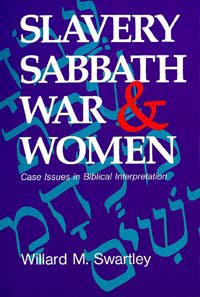
One of the most complicated responsibilities of a minister is to communicate the appropriate interpretations of biblical passages that deal with issues such as slavery, war, and the roles of women, just to mention only some. Just ask any amount of persons in a given congregation and you will most likely get as many opinions on the question asked.
There are two problems that come to mind that can be found within the Christian Church. These two problems can be represented by two different groups of people.
In the first group, you have those that have not read or studied the Bible, and they do not particularly care what the Bible has to say. These people can never actually take the Christian standpoint on an issue because they really have not discovered for themselves what God has to say in His Word.
The second group quite possibly could be the more dangerous group. This group of people likes to pick and choose what they want to believe out of the Bible. They will completely disregard certain Scriptures in order to maintain their opinionated position on any given subject. This is also the same group of people who will not think twice about taking a Scripture verse or passage out of its God-breathed, God-given context.
The author of
Slavery, Sabbath, War, and Women: Case Issues in Biblical Interpretation, William M. Swartley, states that there must be a “wrong or right” in interpreting the Bible. If there were no wrong methods of interpretation, then “the text itself would be only an object, a thing to be used by interpreters however they wish" (22). Again, these are people who fit into group two.
Swartley intends for his book to help students of the Bible to understand that “biblical interpretation…regards both the text and the method of interpretation to be important” (23). Of course, no one can come to the biblical text without and preconceptions whatsoever. All of us carry a certain amount of baggage. However, there are certain principles that the interpreter must keep in mind as he deals with a biblical text.
Swartley offers three critical principles to remember. These principles also guided him in working on his book. First, the biblical interpreter must seriously consider “the historical and cultural contexts of specific texts" (23). Second, he must acknowledge that Scripture has diversity, even within its overall unity. Third, he must allow Scripture to interpret Scripture, and not give priority to “specific statements which stand in tension either with [biblical] principles or with other specific texts on the subject" (23).
Swartley has chosen to deal with four popular but highly controversial issues within Christianity: slavery, Sabbath, war, and women. Each issue has its own chapter devoted to debating the issue at hand. In each chapter you will find arguments on each side of the interpretation of Scripture. For example, in the chapter dealing with the issue of slavery, he gives the argument for and the argument against the institution, along with the Scripture references that each side uses. The Sabbath chapter has three views. The war chapter tries to answer the question as to whether or not we should be pacifists. The chapter on women debates the relationship between man and woman, and the two sides are hierarchical and liberationist. This is one of the goals of the book: “to provide a descriptive statement of how the Bible has been interpreted differently on four separate issues” (24).
I feel that Swartley has done this well. Each argument was presented in an easy-to-follow format. Swartley also made excellent use of history and representatives for each side on an issue.
Swartley’s “primary goal in setting forth alternative positions on these four issues is to provide case illustrations that both show the necessity of careful biblical interpretation and raise methodological issues which hermeneutics must address” (24). By doing this, he has helped me to understand something about the difficulties in interpretation. Not everything is so cut and dry. The serious Bible student must seek wisdom from God. In fact, James instructs us concerning wisdom, “But if any of you lacks wisdom, let him ask of God, who gives to all generously and without reproach, and it will be given to him” (James 1:5). What does this mean? It means that we should always seek wisdom from God when approaching His Word. We need revelation from the Holy Spirit. Swartley has further helped me to see how Scripture can be used and abused.
Another purpose that Swartley has in writing his book is this: “Because the Bible is used in such contradictory ways on these issues, the question of whether the Bible should be used at all for dealing with social issues must be addressed” (25). I am glad that he raises this question because I never would have thought about it. Should we even be using the Bible in this way? Is this even appropriate? Well, I believe that the Bible is our guidebook for life, and what God says must be followed. I believe that the Bible is authoritative for Christians. The problem comes in how people try to use (or abuse) that authority. Swartley has done an excellent job in providing examples in each argument.
Swartley has a desire for this book to help believers avoid the common mistakes made while interpreting Scripture. Since this book is primarily about hermeneutics, “this study will then propose a model of appropriate understandings for believers who desire to use the Bible as a significant resource for shaping values and forming convictions on social issues" (25). I have always disliked the institution of slavery, but after reading the chapter dealing with slavery, I now have a firmer conviction against it. I now have a stronger biblical foundation of why I do not like it, and I now have a better understanding of the opposing side’s argument (however wrong I believe it to be). Swartley’s model “is intended to help interpreters avoid common misuses of the Bible and to create conscious pre-understandings that will make study of the Bible fruitful, allowing it to encounter us with its message" (25). I am thankful for having read this book because it has reminded me that I do not judge the Bible, the Bible judges me.
Swartley also attempts “to translate this model of understandings into a hermeneutical method, consisting of three major components of responsibility: listen carefully from within the text, learn helpfully from behind the text, and live freely from in front of the text” (25). He has included with each chapter a discussion of the hermeneutical issues involved in each case study. For example, in his chapter on the Sabbath, Swartley offers four major and four minor hermeneutical observations and issues “inherent in this study” (91).
“Finally, [Swartley] present[s] a summary of hermeneutical learnings to serve both as an index and a systematic statement of the various hermeneutical insights gained from the study of these four case issues” (25). These learnings and insights can be found in chapter five and in the conclusion to the book. Some of these were review for me, while some of it was enlightening to me and has sharpened my Bible study skills. Swartley has sought to find the common hermeneutical principles that can be used in all four case issues that he presents and can be used in dealing with any social issue. Chapter five compares each issue in such a way.
Swartley has included some other wonder things in his book. First, he has included four appendices: “biblical interpretation in the life of the church” (235), “pacifist answers to new testament problem texts” (250), “interpretive commentary on marriage texts” (256), and “the wider use of the Bible: Ephesians as a model” (270). These appendices helped me to understand the background to some of the arguments presented in the book.
For the student who wishes to dig deeper into the subjects and discussions on hand, a fairly large section of notes has been included followed by one of the largest bibliographies I have come across in reading a book. Two other helpful tools included in the book are the index of scriptures and the index of persons. Suppose I wanted to see if there was any use of Amos 2:10, all I have to do is look and see if it is listed in the index (it is found on page 351 in the index), and then turn to the appropriately listed page number in the book. Or suppose I desired to look up a statement concerning Innocentius but I could not remember where to find it. Well, all I have to do is flip to the index of persons and find his name, and then I can turn to page 76 where the statement is found.
It has normally been the case when professors assign required books to be read that they are not an enjoyable experience. That was not the total case with book. There were times when I simply could not put it down because I wanted to finish reading an argument in the book. I also liked it because it was not particularly a difficult book to read, and, on top of that, it did not take that long to read.
As I mentioned earlier, I really liked the format of the book. It is user friendly and it is easy to find what I am looking for in a given chapter. In other words, the book is well organized.
For example, allow me to analyze the chapter dealing with slavery (chapter one). Swartley starts by giving me the argument for and the argument against slavery in summary statements made by John Henry Hopkins and Theodore Dwight Weld, representatives from each side respectively. He then proceeds to introduce to me the debaters that will contribute to one side of the argument: the pro-slavery cause. In the slavery chapter, seven men are briefly introduced to give me their background and qualifications for speaking to the issue of slaver in favor of it. Likewise, in the anti-slavery section, seven more men are introduced. Each side’s position is stated followed by theses concerning each position. Then a section is provided for rebuttal arguments. Finally, at the end of the chapter, Swartley gives his insights and commentary about the uses of the Bible in relation to the issue of slavery.
Since I like hearing debates, I found the setup of this book to be quite enjoyable. Swartley could have presented the information in a number of ways, but I am glad he chose the form of debate. By doing so, I went away with the feeling that each side was allowed to speak for themselves.
I particularly found some of his commentary sections to be quite helpful. For example, allow me to return once again to the slavery chapter. There you will find a discussion on the meaning of the word “literal”. Swartley states “the term ‘literal’ usually means the understanding of texts in a mechanical way” (59). For instance, when Isaiah talks about the trees of the forest clapping their hands, by this definition, they will literally grow arms and hands and will clap. However, Swartley goes on to write that the word “may be used in almost an opposite way, as it was in the time of the Reformation, to mean the text’s historical meaning, or the plain sense of the text” (59). Oftentimes, the plain sense of the text does not make plain sense. That is when you must interpret the given text in a different light. It has been my observation that trees do not clap their hands on a regular basis. It would be like a bunch of happy Ents (tree people) from The Lord of the Rings. One must realize that the Bible contains different genres of writing, including poetry, which often employs figurative language to get a message across. Discussions such as this one help me to understand the meanings of terms used. Since words often change meanings over time, this is important information to know when reading statements from people from a time far gone.
One thing that I did not like about the book is this: just when I was getting into an argument, it was time for it to come to an end. Ideally, each issue handled should have its own book devoted to it, but I think that would defeat the purpose for why Swartley wrote the book in the way that he did.
Swartley concludes his introduction to the book with these words, “Above all, I hope that this study will help every reader to a more aware and responsible use of the Bible in today’s world” (28). Well, he has helped me to me more aware of how I use Scripture regarding social issues that are around me today. At the writing of this, my world is affected by war and a massive natural disaster. This book has helped me in gathering insight on how to use to Bible properly in taking a stance based on the Word of God.
I would recommend this book to those who desire to gain a better understanding of the four controversial issues given in the book. I would also recommend it to any Christian who is serious about studying the Bible simply for the hermeneutical principles listed throughout the book. Churches all over the world would do well to teach the people how to properly interpret Scripture.
If we fail in doing so, then those who misuse Scripture will continue to grow in numbers. Scriptural ignorance will be even higher than it is already. The effects of group two, as presented earlier in this paper, will lead more and more people to disregard the Bible altogether and move into group one. God help us all to take Scripture more seriously. Not only that, but that He would help us in properly interpreting His Word. Perhaps He will use people like Swartley to help others take a more sober approach to the Bible.








